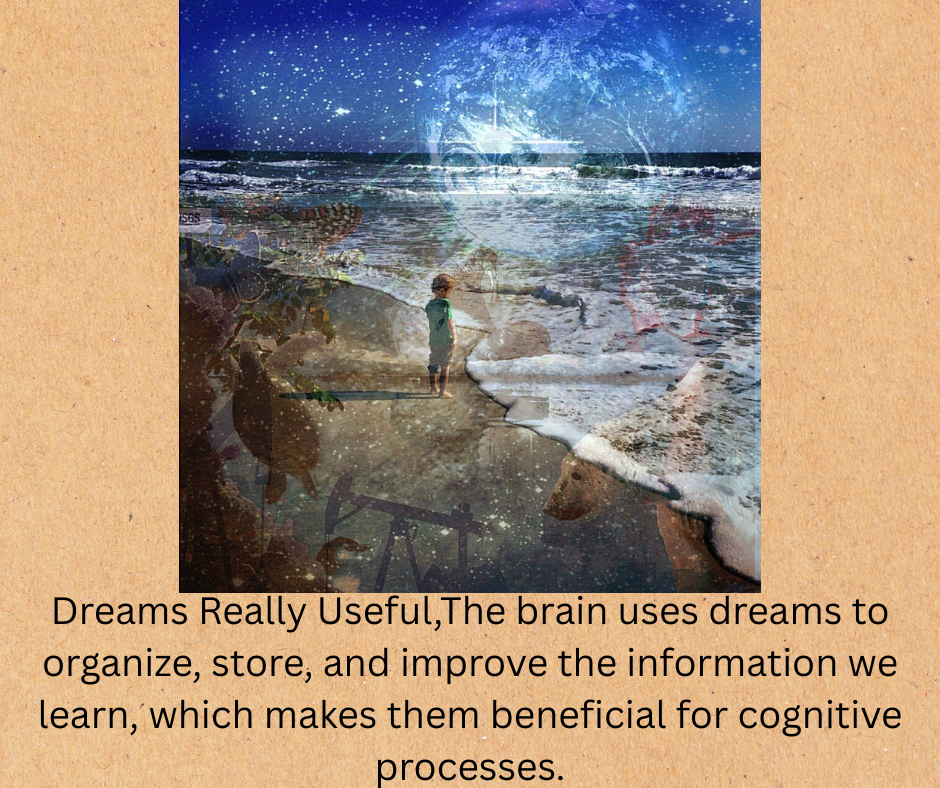Dreams Really Useful,For generations, people from all walks of life have been fascinated by dreams and have tried to figure out what they mean. From ancient societies that interpreted dreams as divine messages to contemporary psychologists who see them as subconscious manifestations, the function and significance of dreams continue to be hotly debated topics.

Still, the issue remains: can dreams actually serve a purpose? Are they fundamental to our mental, emotional, and even physical health, or do they only provide us with weird and fantastical circumstances to amuse us?
Table of Contents
It is very important to examine our dreams in different ways to get answers to all these things – biological, psychological, emotional and cultural. By taking into account the different purposes of dreams, we can determine whether they are just sporadic patterns of brain activity or if they have a deeper meaning that enhances our overall health and well-being.
Biological Perspective:
A Mechanism for Memory Consolidation
The idea that dreams serve as a component of the brain’s memory consolidation process is among the best-supported ideas on their function. Dreams Really Useful,All the information that is stored in the brain throughout the day, the brain organizes all that information when we sleep.Learning, remembering new knowledge, and structuring memories for later use all depend on this process, which is called memory consolidation.
The majority of vivid dreams happen during the Rapid Eye Movement (REM) period of sleep, when the brain is most active.
According to research, the brain is actively processing information, feelings, and recent experiences during this phase. According to studies, those who are deprived of REM sleep—for example, in experimental settings or sleep disorders—generally have poor learning and memory retention skills.
Under these circumstances, dreams could be an extension of this memory-processing ability. Dreams may be useful for organizing and preserving memories as well as for combining them with previously acquired information.
For instance, if someone has learnt something new throughout the day, they may have scenarios in their dreams that help them comprehend or make sense of what they have learned. Dreams Really Useful,The brain uses dreams to organize, store, and improve the information we learn, which makes them beneficial for cognitive processes.
Psychological Perspective:
Processing Emotions and Stress
Dreams may have a significant emotional purpose in addition to memory consolidation. One of the fundamental psychological theories regarding dreams comes from Sigmund Freud, who suggested that dreams represent unconscious urges and repressed thoughts. According to Freud, the content of dreams is symbolic and often represents unresolved conflicts, suppressed emotions, or desires that we are not completely conscious of during our waking hours.
Dreams turn into a tool for processing emotions in this situation. Dreams enable the person to face unresolved emotional difficulties in a safe and controlled setting by bringing these suppressed thoughts and feelings to life.
For example, a person who has just gone through a traumatic event, such as a terrible breakup or the death of a loved one, might dream about situations that help them deal with these feelings. Dreams Really Useful,The dream’s emotional content offers the mind a less overt, subconscious method of processing sadness, worry, or pain.
Research backs up this theory, demonstrating that people frequently dream about traumatic or stressful experiences soon after they occur. Dreams allow the mind to analyze and relive these emotions, which helps it control emotional reactions and make sense of intense emotions. In the end, this process can help people manage stress and enhance their emotional health, which makes dreams helpful in guiding us through our emotional life.
Dreams as a Problem-Solving Tool
The ability of dreams to solve problems is another intriguing feature. Numerous people claim that they have solved difficult puzzles or had original ideas while dreaming. Famous instances of this phenomena can be found throughout history, such as August Kekulé’s dream about the structure of the benzene ring and Albert Einstein’s dream about the theory of relativity.

A significant amount of cognition and memory remodeling occurs in the brain while you sleep. Unconsciously making connections between seemingly unrelated facts may be one way this rearrangement occurs, providing fresh insights or answers to issues we have been struggling with while we are awake. Dreams Really Useful,For those who work in creative professions or must make difficult judgments, the capacity to solve problems while sleeping may be extremely helpful.
The notion that dreams might foster creativity is supported by research on this topic. After learning a new activity, participants who were permitted to take a nap outperformed those who remained up, according to a study published in the journal Consciousness and Cognition.
Their naps, which included REM sleep and dreaming, appeared to have improved their performance by allowing their brains to digest the information and build new connections. In this way, dreams can be viewed as a helpful tool for innovative thinking and creative problem-solving.
Dreams and Healing:
Psychological and Physical Restoration
Additionally, Because of dreams we are able to remain healthy both physically and mentally. The relationship between sleep and general health is well established, and it has been demonstrated that restorative sleep is critical for mental health, immunological response, and recuperation.
Dreams Really Useful,This healing process includes dreams, which mostly happen during REM sleep. From a psychological perspective, dreaming could aid in a person’s recovery from emotional pain or trauma.
Even though they are upsetting, post-traumatic dreams might aid in a person’s healing process. Despite their discomfort, these kinds of dreams can help the dreamer face and process previous trauma, which eventually increases emotional resilience. Although difficult, this dream function aids in emotional development and mental healing.
Furthermore, there is some evidence that suggests dreaming may play a part in physical recovery. Immune system function, cell regeneration and repair, and other biological processes that are essential for good health have all been connected to sleep, and REM sleep in particular. Dreams Really Useful,Dreams are a component of the sleep cycle that promotes physiological healing and recovery, even if they might not directly aid in this physical recuperation.
Cultural and Spiritual Perspectives:
Dreams as Guidance and Insight
Dreams are frequently seen as a source of direction, wisdom, or even prophesy in many cultures and spiritual traditions, and are not just thought of as random mental processes. Dreams have long been considered a channel for communication from the spirit world or the divine by indigenous societies, ancient civilizations, and different religious groups.
These explanations imply that dreams might have a higher function, such imparting knowledge, predicting the future, or facilitating communication with spirits or ancestors.
Dreams are frequently regarded in these traditions as providing valuable insights that transcend the individual’s mind. In many Native American societies, for instance, dreams are seen as a means of communication between people and spiritual entities. Dreams may have a spiritual or moral value in this situation, assisting people in finding their purpose or giving them guidance in life.
Even while contemporary psychology tends to see dreams as subconscious creations, many people’s perceptions of the function of dreams are still influenced by these cultural interpretations. Some people use dreams as a useful tool for self-discovery or to communicate with a higher spiritual plane. Regardless of the scientific validity of these interpretations, they demonstrate how many people use their dreams to derive profound personal meaning and direction.
The Role of Lucid Dreaming:
Conscious Control and Exploration
Dreams are not merely passive experiences, as evidenced by lucid dreaming, which is the capacity to become conscious of and in control of one’s dreams. Through the exploration of fantasies or creative endeavors within the dream world, lucid dreamers are able to deliberately control their dream experiences.
Dreams Really Useful,According to some academics, lucid dreaming is a method of intentionally interacting with the subconscious that allows people to practice skills, overcome phobias, or just explore new possibilities.
Some lucid dreamers use dreams to escape or cope with worries or nightmares They can turn scary situations into enjoyable ones by being conscious of the dream state and taking charge of the dream environment. The usefulness of dreams in psychological self-regulation is further shown by this capacity to manage dreams and conduct controlled subconscious exploration.
Conclusion:
Are Dreams Really Useful?
In conclusion, it is evident that dreams have a number of purposes that are advantageous to our mental, emotional, and even physical health, even though their precise function is yet unknown. Dreams are essential for processing emotions, resolving problems, and consolidating memories. They provide a way for our brains to break down internal conflicts, digest and integrate new knowledge, and come up with original solutions to issues. In many cultures, they are seen as a source of spiritual insight and guidance, and they also aid in emotional healing and recovery.
It is clear that dreams are far from meaningless, even though we may not always comprehend their significance or the strange settings they depict. Dreams are a potent tool that are vital to our general health and well-being, whether they are used to process emotions, help with memory retention, or promote personal development. Therefore, it is true that dreams provide benefits that extend beyond our waking lives and are both universal and personal.